Victoria University: HMG7200 Social Cognitive Theory Critique Report
VerifiedAdded on 2022/12/30
|7
|1736
|1
Report
AI Summary
This report provides a critical analysis of the Social Cognitive Theory (SCT), examining its core components: personal elements, environmental impacts, and behavior. It explores the theory's foundations, including the contributions of Albert Bandura and its roots in behavioristic, emotional, and cognitive models. The report assesses the theory's application in health promotion, detailing its use in individual behavior change, community interventions, and organizational settings. It also discusses the evaluation methods for assessing the success of SCT-based interventions, such as self-monitoring and observational learning. The report references key studies and provides insights into how SCT can be used to guide and evaluate health promotion strategies, particularly in the context of public health and well-being.
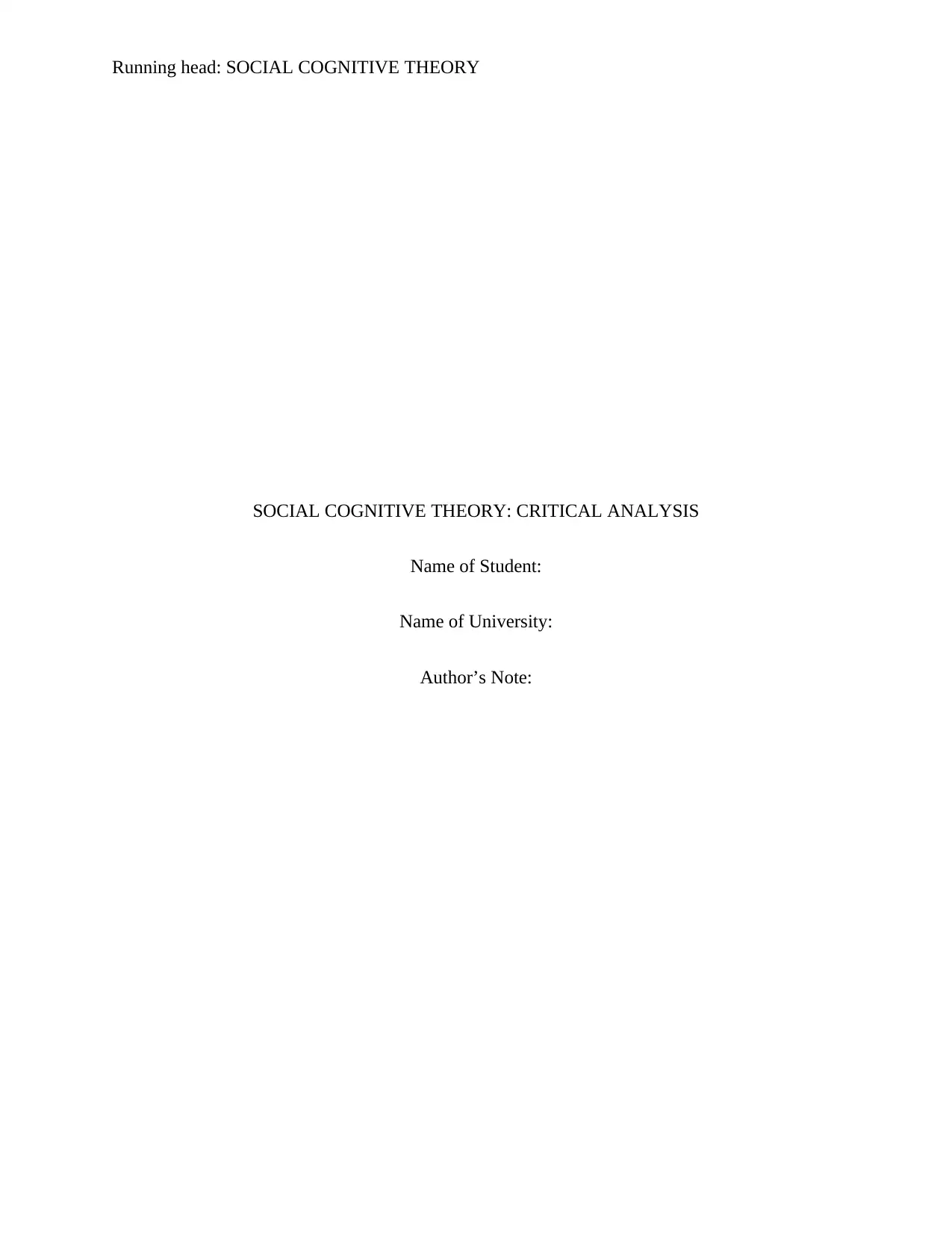
Running head: SOCIAL COGNITIVE THEORY
SOCIAL COGNITIVE THEORY: CRITICAL ANALYSIS
Name of Student:
Name of University:
Author’s Note:
SOCIAL COGNITIVE THEORY: CRITICAL ANALYSIS
Name of Student:
Name of University:
Author’s Note:
Paraphrase This Document
Need a fresh take? Get an instant paraphrase of this document with our AI Paraphraser
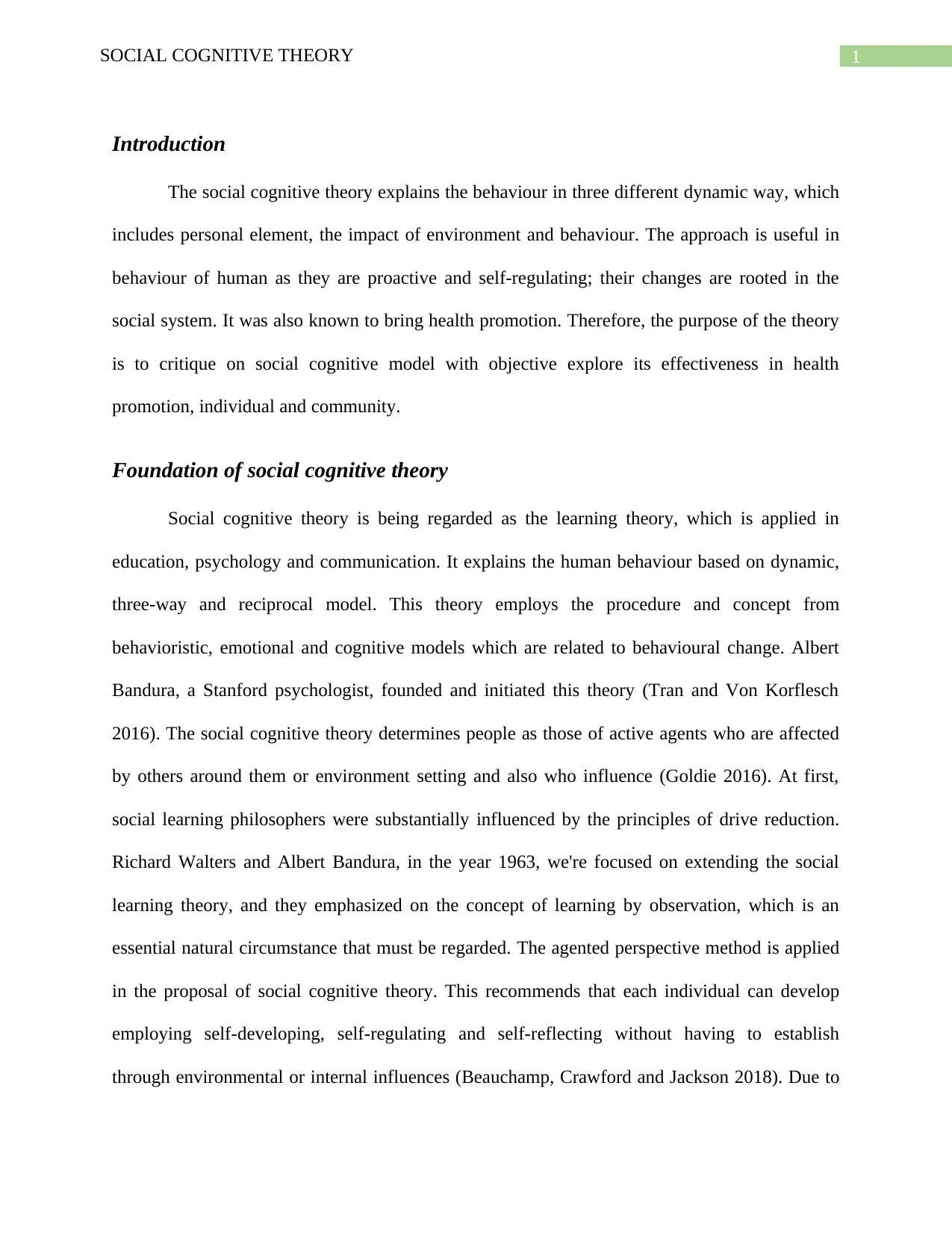
1SOCIAL COGNITIVE THEORY
Introduction
The social cognitive theory explains the behaviour in three different dynamic way, which
includes personal element, the impact of environment and behaviour. The approach is useful in
behaviour of human as they are proactive and self-regulating; their changes are rooted in the
social system. It was also known to bring health promotion. Therefore, the purpose of the theory
is to critique on social cognitive model with objective explore its effectiveness in health
promotion, individual and community.
Foundation of social cognitive theory
Social cognitive theory is being regarded as the learning theory, which is applied in
education, psychology and communication. It explains the human behaviour based on dynamic,
three-way and reciprocal model. This theory employs the procedure and concept from
behavioristic, emotional and cognitive models which are related to behavioural change. Albert
Bandura, a Stanford psychologist, founded and initiated this theory (Tran and Von Korflesch
2016). The social cognitive theory determines people as those of active agents who are affected
by others around them or environment setting and also who influence (Goldie 2016). At first,
social learning philosophers were substantially influenced by the principles of drive reduction.
Richard Walters and Albert Bandura, in the year 1963, we're focused on extending the social
learning theory, and they emphasized on the concept of learning by observation, which is an
essential natural circumstance that must be regarded. The agented perspective method is applied
in the proposal of social cognitive theory. This recommends that each individual can develop
employing self-developing, self-regulating and self-reflecting without having to establish
through environmental or internal influences (Beauchamp, Crawford and Jackson 2018). Due to
Introduction
The social cognitive theory explains the behaviour in three different dynamic way, which
includes personal element, the impact of environment and behaviour. The approach is useful in
behaviour of human as they are proactive and self-regulating; their changes are rooted in the
social system. It was also known to bring health promotion. Therefore, the purpose of the theory
is to critique on social cognitive model with objective explore its effectiveness in health
promotion, individual and community.
Foundation of social cognitive theory
Social cognitive theory is being regarded as the learning theory, which is applied in
education, psychology and communication. It explains the human behaviour based on dynamic,
three-way and reciprocal model. This theory employs the procedure and concept from
behavioristic, emotional and cognitive models which are related to behavioural change. Albert
Bandura, a Stanford psychologist, founded and initiated this theory (Tran and Von Korflesch
2016). The social cognitive theory determines people as those of active agents who are affected
by others around them or environment setting and also who influence (Goldie 2016). At first,
social learning philosophers were substantially influenced by the principles of drive reduction.
Richard Walters and Albert Bandura, in the year 1963, we're focused on extending the social
learning theory, and they emphasized on the concept of learning by observation, which is an
essential natural circumstance that must be regarded. The agented perspective method is applied
in the proposal of social cognitive theory. This recommends that each individual can develop
employing self-developing, self-regulating and self-reflecting without having to establish
through environmental or internal influences (Beauchamp, Crawford and Jackson 2018). Due to
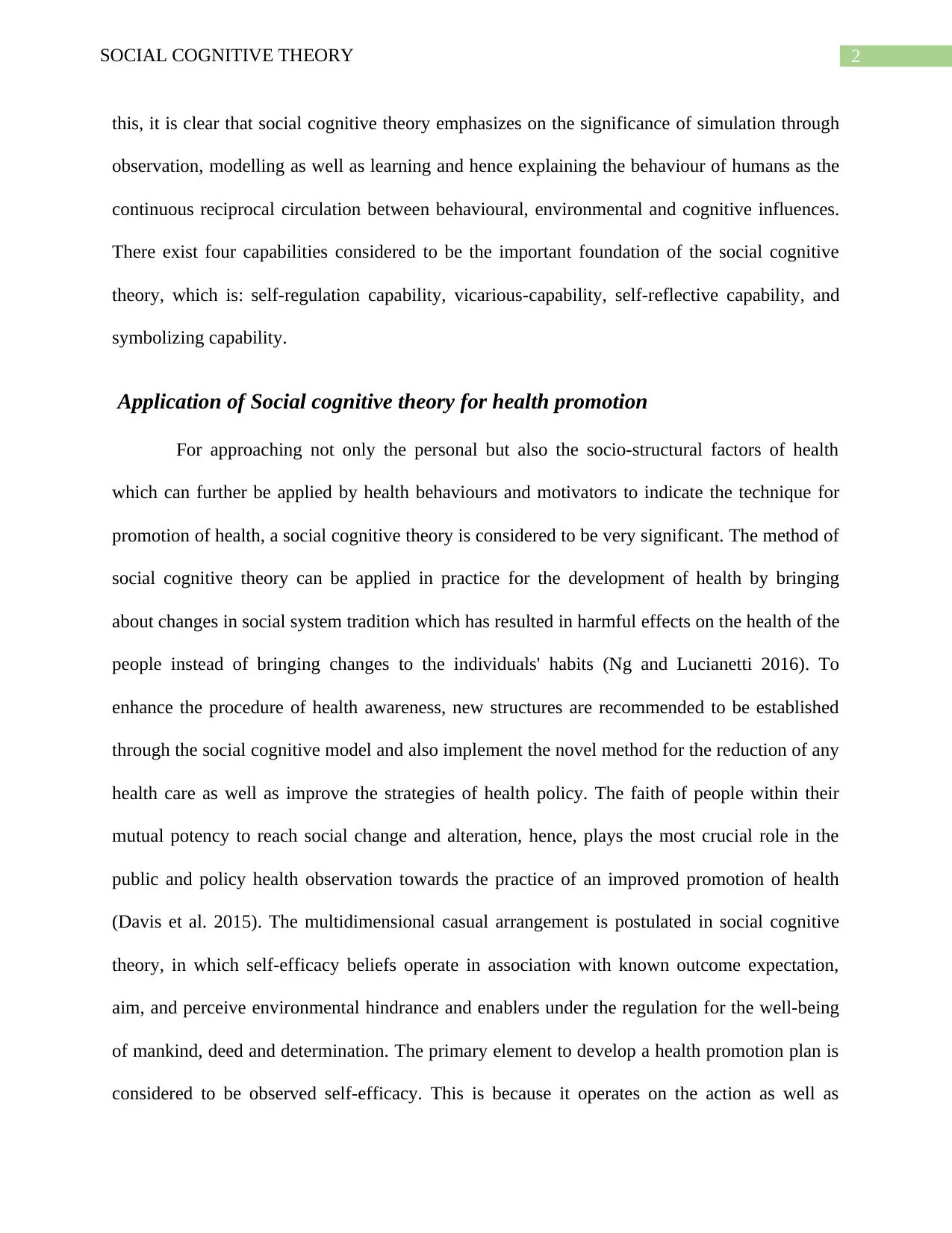
2SOCIAL COGNITIVE THEORY
this, it is clear that social cognitive theory emphasizes on the significance of simulation through
observation, modelling as well as learning and hence explaining the behaviour of humans as the
continuous reciprocal circulation between behavioural, environmental and cognitive influences.
There exist four capabilities considered to be the important foundation of the social cognitive
theory, which is: self-regulation capability, vicarious-capability, self-reflective capability, and
symbolizing capability.
Application of Social cognitive theory for health promotion
For approaching not only the personal but also the socio-structural factors of health
which can further be applied by health behaviours and motivators to indicate the technique for
promotion of health, a social cognitive theory is considered to be very significant. The method of
social cognitive theory can be applied in practice for the development of health by bringing
about changes in social system tradition which has resulted in harmful effects on the health of the
people instead of bringing changes to the individuals' habits (Ng and Lucianetti 2016). To
enhance the procedure of health awareness, new structures are recommended to be established
through the social cognitive model and also implement the novel method for the reduction of any
health care as well as improve the strategies of health policy. The faith of people within their
mutual potency to reach social change and alteration, hence, plays the most crucial role in the
public and policy health observation towards the practice of an improved promotion of health
(Davis et al. 2015). The multidimensional casual arrangement is postulated in social cognitive
theory, in which self-efficacy beliefs operate in association with known outcome expectation,
aim, and perceive environmental hindrance and enablers under the regulation for the well-being
of mankind, deed and determination. The primary element to develop a health promotion plan is
considered to be observed self-efficacy. This is because it operates on the action as well as
this, it is clear that social cognitive theory emphasizes on the significance of simulation through
observation, modelling as well as learning and hence explaining the behaviour of humans as the
continuous reciprocal circulation between behavioural, environmental and cognitive influences.
There exist four capabilities considered to be the important foundation of the social cognitive
theory, which is: self-regulation capability, vicarious-capability, self-reflective capability, and
symbolizing capability.
Application of Social cognitive theory for health promotion
For approaching not only the personal but also the socio-structural factors of health
which can further be applied by health behaviours and motivators to indicate the technique for
promotion of health, a social cognitive theory is considered to be very significant. The method of
social cognitive theory can be applied in practice for the development of health by bringing
about changes in social system tradition which has resulted in harmful effects on the health of the
people instead of bringing changes to the individuals' habits (Ng and Lucianetti 2016). To
enhance the procedure of health awareness, new structures are recommended to be established
through the social cognitive model and also implement the novel method for the reduction of any
health care as well as improve the strategies of health policy. The faith of people within their
mutual potency to reach social change and alteration, hence, plays the most crucial role in the
public and policy health observation towards the practice of an improved promotion of health
(Davis et al. 2015). The multidimensional casual arrangement is postulated in social cognitive
theory, in which self-efficacy beliefs operate in association with known outcome expectation,
aim, and perceive environmental hindrance and enablers under the regulation for the well-being
of mankind, deed and determination. The primary element to develop a health promotion plan is
considered to be observed self-efficacy. This is because it operates on the action as well as
⊘ This is a preview!⊘
Do you want full access?
Subscribe today to unlock all pages.

Trusted by 1+ million students worldwide
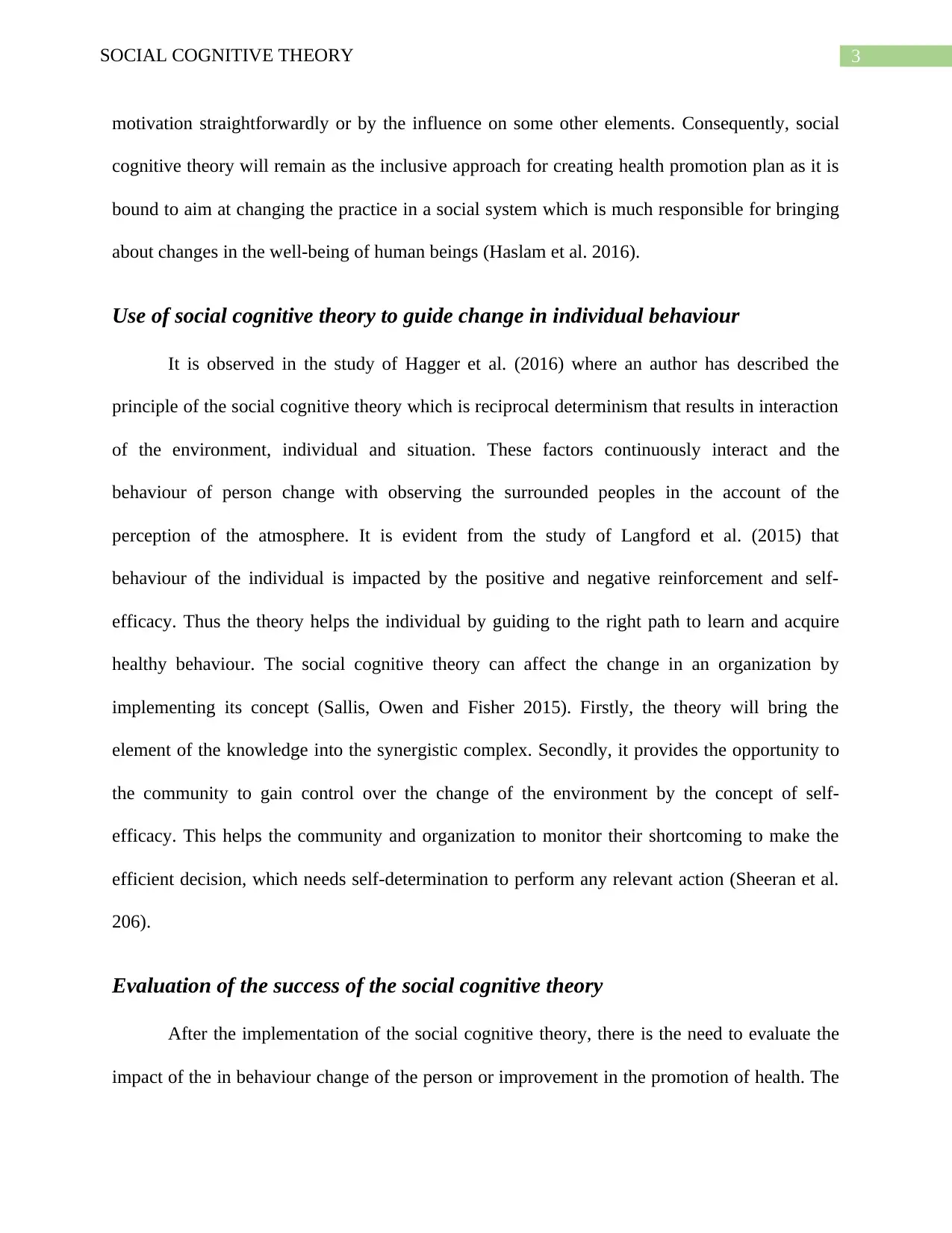
3SOCIAL COGNITIVE THEORY
motivation straightforwardly or by the influence on some other elements. Consequently, social
cognitive theory will remain as the inclusive approach for creating health promotion plan as it is
bound to aim at changing the practice in a social system which is much responsible for bringing
about changes in the well-being of human beings (Haslam et al. 2016).
Use of social cognitive theory to guide change in individual behaviour
It is observed in the study of Hagger et al. (2016) where an author has described the
principle of the social cognitive theory which is reciprocal determinism that results in interaction
of the environment, individual and situation. These factors continuously interact and the
behaviour of person change with observing the surrounded peoples in the account of the
perception of the atmosphere. It is evident from the study of Langford et al. (2015) that
behaviour of the individual is impacted by the positive and negative reinforcement and self-
efficacy. Thus the theory helps the individual by guiding to the right path to learn and acquire
healthy behaviour. The social cognitive theory can affect the change in an organization by
implementing its concept (Sallis, Owen and Fisher 2015). Firstly, the theory will bring the
element of the knowledge into the synergistic complex. Secondly, it provides the opportunity to
the community to gain control over the change of the environment by the concept of self-
efficacy. This helps the community and organization to monitor their shortcoming to make the
efficient decision, which needs self-determination to perform any relevant action (Sheeran et al.
206).
Evaluation of the success of the social cognitive theory
After the implementation of the social cognitive theory, there is the need to evaluate the
impact of the in behaviour change of the person or improvement in the promotion of health. The
motivation straightforwardly or by the influence on some other elements. Consequently, social
cognitive theory will remain as the inclusive approach for creating health promotion plan as it is
bound to aim at changing the practice in a social system which is much responsible for bringing
about changes in the well-being of human beings (Haslam et al. 2016).
Use of social cognitive theory to guide change in individual behaviour
It is observed in the study of Hagger et al. (2016) where an author has described the
principle of the social cognitive theory which is reciprocal determinism that results in interaction
of the environment, individual and situation. These factors continuously interact and the
behaviour of person change with observing the surrounded peoples in the account of the
perception of the atmosphere. It is evident from the study of Langford et al. (2015) that
behaviour of the individual is impacted by the positive and negative reinforcement and self-
efficacy. Thus the theory helps the individual by guiding to the right path to learn and acquire
healthy behaviour. The social cognitive theory can affect the change in an organization by
implementing its concept (Sallis, Owen and Fisher 2015). Firstly, the theory will bring the
element of the knowledge into the synergistic complex. Secondly, it provides the opportunity to
the community to gain control over the change of the environment by the concept of self-
efficacy. This helps the community and organization to monitor their shortcoming to make the
efficient decision, which needs self-determination to perform any relevant action (Sheeran et al.
206).
Evaluation of the success of the social cognitive theory
After the implementation of the social cognitive theory, there is the need to evaluate the
impact of the in behaviour change of the person or improvement in the promotion of health. The
Paraphrase This Document
Need a fresh take? Get an instant paraphrase of this document with our AI Paraphraser
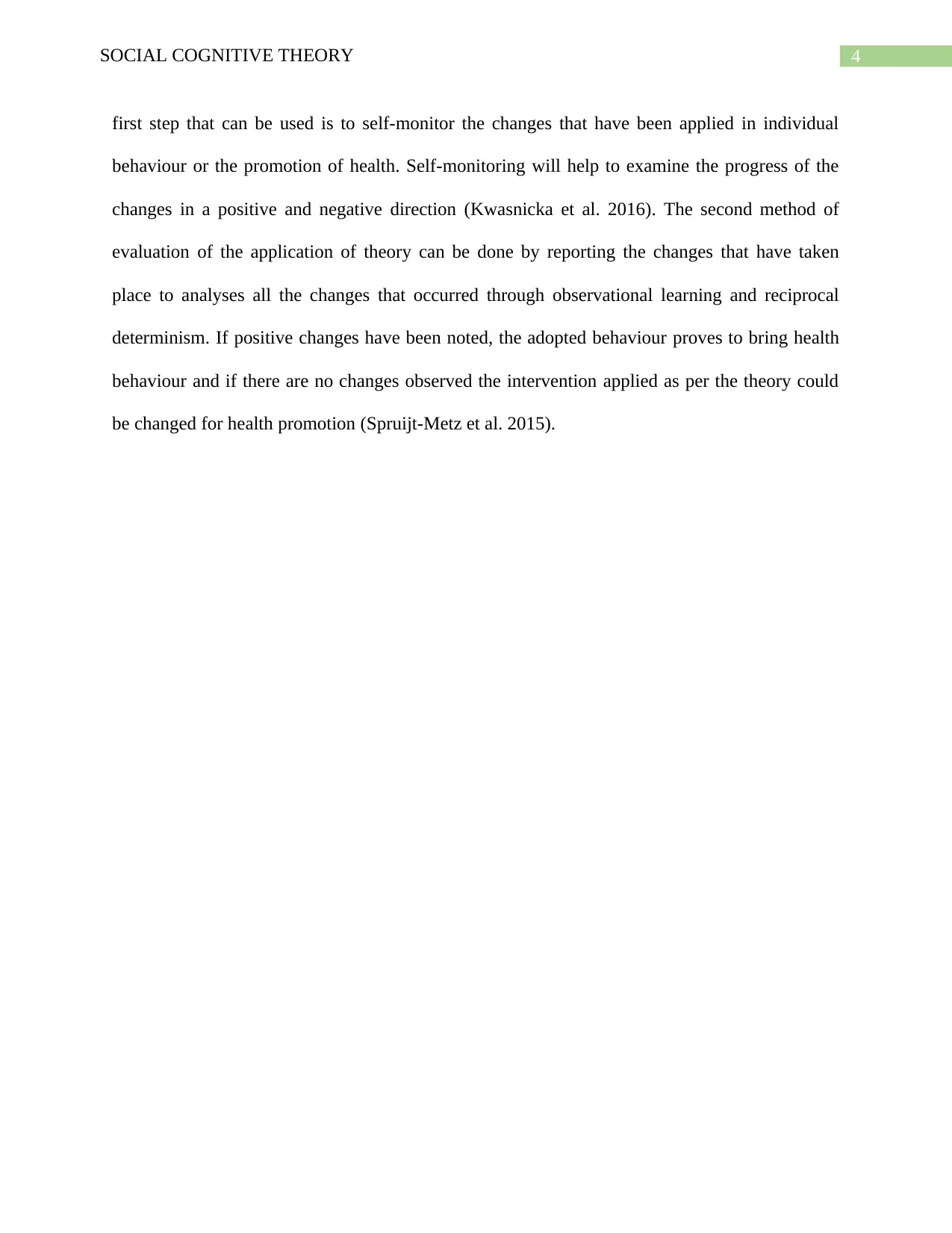
4SOCIAL COGNITIVE THEORY
first step that can be used is to self-monitor the changes that have been applied in individual
behaviour or the promotion of health. Self-monitoring will help to examine the progress of the
changes in a positive and negative direction (Kwasnicka et al. 2016). The second method of
evaluation of the application of theory can be done by reporting the changes that have taken
place to analyses all the changes that occurred through observational learning and reciprocal
determinism. If positive changes have been noted, the adopted behaviour proves to bring health
behaviour and if there are no changes observed the intervention applied as per the theory could
be changed for health promotion (Spruijt-Metz et al. 2015).
first step that can be used is to self-monitor the changes that have been applied in individual
behaviour or the promotion of health. Self-monitoring will help to examine the progress of the
changes in a positive and negative direction (Kwasnicka et al. 2016). The second method of
evaluation of the application of theory can be done by reporting the changes that have taken
place to analyses all the changes that occurred through observational learning and reciprocal
determinism. If positive changes have been noted, the adopted behaviour proves to bring health
behaviour and if there are no changes observed the intervention applied as per the theory could
be changed for health promotion (Spruijt-Metz et al. 2015).
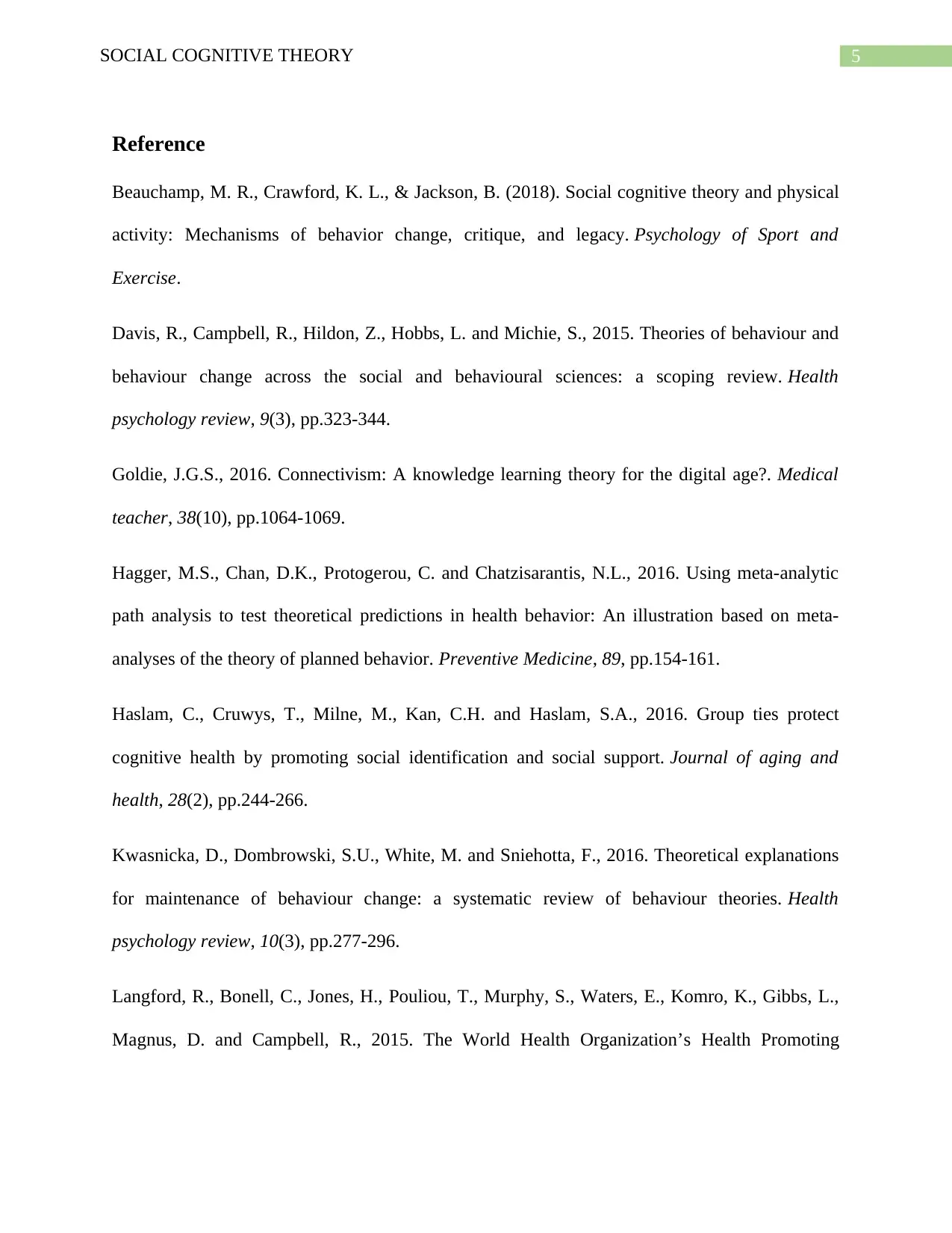
5SOCIAL COGNITIVE THEORY
Reference
Beauchamp, M. R., Crawford, K. L., & Jackson, B. (2018). Social cognitive theory and physical
activity: Mechanisms of behavior change, critique, and legacy. Psychology of Sport and
Exercise.
Davis, R., Campbell, R., Hildon, Z., Hobbs, L. and Michie, S., 2015. Theories of behaviour and
behaviour change across the social and behavioural sciences: a scoping review. Health
psychology review, 9(3), pp.323-344.
Goldie, J.G.S., 2016. Connectivism: A knowledge learning theory for the digital age?. Medical
teacher, 38(10), pp.1064-1069.
Hagger, M.S., Chan, D.K., Protogerou, C. and Chatzisarantis, N.L., 2016. Using meta-analytic
path analysis to test theoretical predictions in health behavior: An illustration based on meta-
analyses of the theory of planned behavior. Preventive Medicine, 89, pp.154-161.
Haslam, C., Cruwys, T., Milne, M., Kan, C.H. and Haslam, S.A., 2016. Group ties protect
cognitive health by promoting social identification and social support. Journal of aging and
health, 28(2), pp.244-266.
Kwasnicka, D., Dombrowski, S.U., White, M. and Sniehotta, F., 2016. Theoretical explanations
for maintenance of behaviour change: a systematic review of behaviour theories. Health
psychology review, 10(3), pp.277-296.
Langford, R., Bonell, C., Jones, H., Pouliou, T., Murphy, S., Waters, E., Komro, K., Gibbs, L.,
Magnus, D. and Campbell, R., 2015. The World Health Organization’s Health Promoting
Reference
Beauchamp, M. R., Crawford, K. L., & Jackson, B. (2018). Social cognitive theory and physical
activity: Mechanisms of behavior change, critique, and legacy. Psychology of Sport and
Exercise.
Davis, R., Campbell, R., Hildon, Z., Hobbs, L. and Michie, S., 2015. Theories of behaviour and
behaviour change across the social and behavioural sciences: a scoping review. Health
psychology review, 9(3), pp.323-344.
Goldie, J.G.S., 2016. Connectivism: A knowledge learning theory for the digital age?. Medical
teacher, 38(10), pp.1064-1069.
Hagger, M.S., Chan, D.K., Protogerou, C. and Chatzisarantis, N.L., 2016. Using meta-analytic
path analysis to test theoretical predictions in health behavior: An illustration based on meta-
analyses of the theory of planned behavior. Preventive Medicine, 89, pp.154-161.
Haslam, C., Cruwys, T., Milne, M., Kan, C.H. and Haslam, S.A., 2016. Group ties protect
cognitive health by promoting social identification and social support. Journal of aging and
health, 28(2), pp.244-266.
Kwasnicka, D., Dombrowski, S.U., White, M. and Sniehotta, F., 2016. Theoretical explanations
for maintenance of behaviour change: a systematic review of behaviour theories. Health
psychology review, 10(3), pp.277-296.
Langford, R., Bonell, C., Jones, H., Pouliou, T., Murphy, S., Waters, E., Komro, K., Gibbs, L.,
Magnus, D. and Campbell, R., 2015. The World Health Organization’s Health Promoting
⊘ This is a preview!⊘
Do you want full access?
Subscribe today to unlock all pages.

Trusted by 1+ million students worldwide
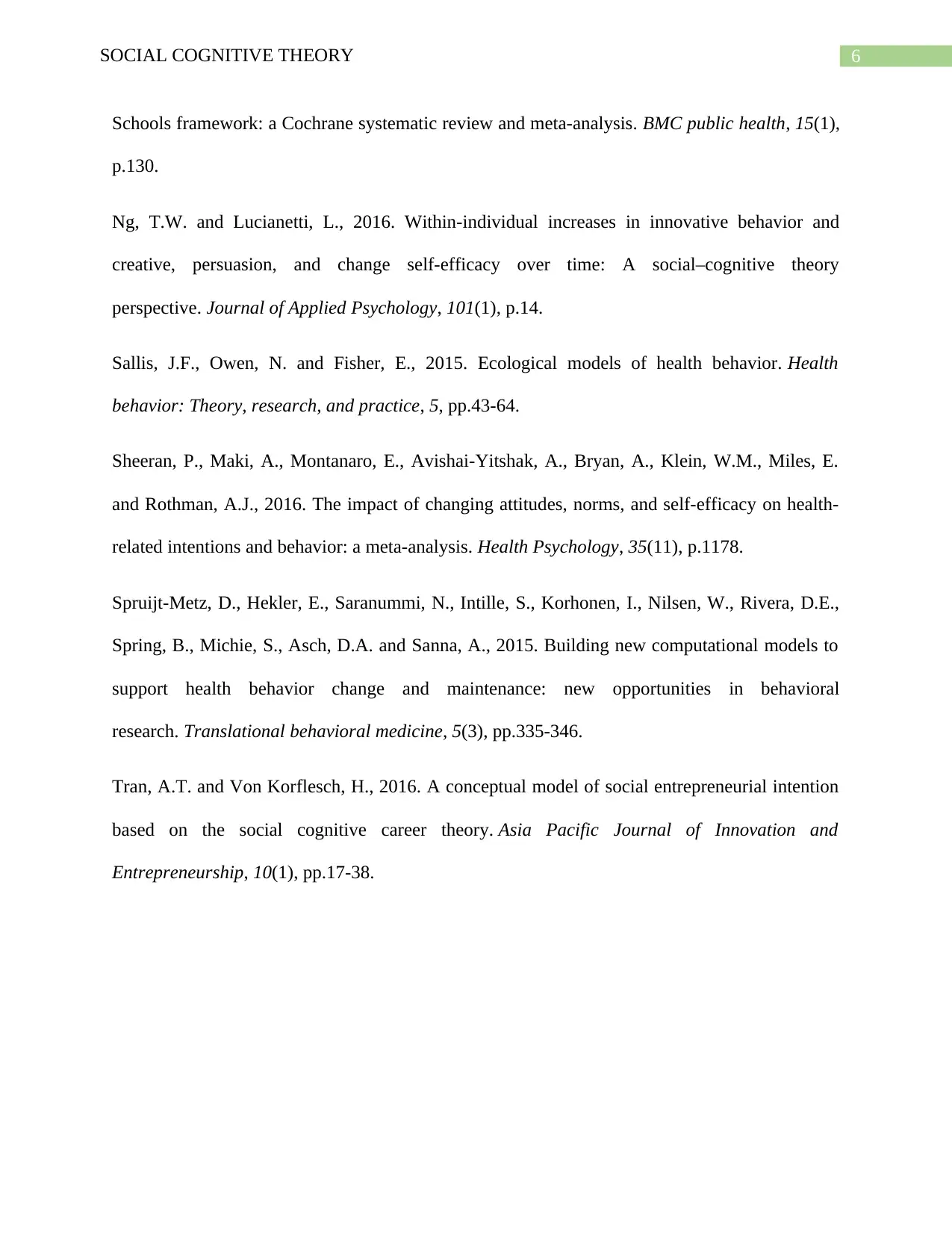
6SOCIAL COGNITIVE THEORY
Schools framework: a Cochrane systematic review and meta-analysis. BMC public health, 15(1),
p.130.
Ng, T.W. and Lucianetti, L., 2016. Within-individual increases in innovative behavior and
creative, persuasion, and change self-efficacy over time: A social–cognitive theory
perspective. Journal of Applied Psychology, 101(1), p.14.
Sallis, J.F., Owen, N. and Fisher, E., 2015. Ecological models of health behavior. Health
behavior: Theory, research, and practice, 5, pp.43-64.
Sheeran, P., Maki, A., Montanaro, E., Avishai-Yitshak, A., Bryan, A., Klein, W.M., Miles, E.
and Rothman, A.J., 2016. The impact of changing attitudes, norms, and self-efficacy on health-
related intentions and behavior: a meta-analysis. Health Psychology, 35(11), p.1178.
Spruijt-Metz, D., Hekler, E., Saranummi, N., Intille, S., Korhonen, I., Nilsen, W., Rivera, D.E.,
Spring, B., Michie, S., Asch, D.A. and Sanna, A., 2015. Building new computational models to
support health behavior change and maintenance: new opportunities in behavioral
research. Translational behavioral medicine, 5(3), pp.335-346.
Tran, A.T. and Von Korflesch, H., 2016. A conceptual model of social entrepreneurial intention
based on the social cognitive career theory. Asia Pacific Journal of Innovation and
Entrepreneurship, 10(1), pp.17-38.
Schools framework: a Cochrane systematic review and meta-analysis. BMC public health, 15(1),
p.130.
Ng, T.W. and Lucianetti, L., 2016. Within-individual increases in innovative behavior and
creative, persuasion, and change self-efficacy over time: A social–cognitive theory
perspective. Journal of Applied Psychology, 101(1), p.14.
Sallis, J.F., Owen, N. and Fisher, E., 2015. Ecological models of health behavior. Health
behavior: Theory, research, and practice, 5, pp.43-64.
Sheeran, P., Maki, A., Montanaro, E., Avishai-Yitshak, A., Bryan, A., Klein, W.M., Miles, E.
and Rothman, A.J., 2016. The impact of changing attitudes, norms, and self-efficacy on health-
related intentions and behavior: a meta-analysis. Health Psychology, 35(11), p.1178.
Spruijt-Metz, D., Hekler, E., Saranummi, N., Intille, S., Korhonen, I., Nilsen, W., Rivera, D.E.,
Spring, B., Michie, S., Asch, D.A. and Sanna, A., 2015. Building new computational models to
support health behavior change and maintenance: new opportunities in behavioral
research. Translational behavioral medicine, 5(3), pp.335-346.
Tran, A.T. and Von Korflesch, H., 2016. A conceptual model of social entrepreneurial intention
based on the social cognitive career theory. Asia Pacific Journal of Innovation and
Entrepreneurship, 10(1), pp.17-38.
1 out of 7
Related Documents
Your All-in-One AI-Powered Toolkit for Academic Success.
+13062052269
info@desklib.com
Available 24*7 on WhatsApp / Email
![[object Object]](/_next/static/media/star-bottom.7253800d.svg)
Unlock your academic potential
Copyright © 2020–2025 A2Z Services. All Rights Reserved. Developed and managed by ZUCOL.





